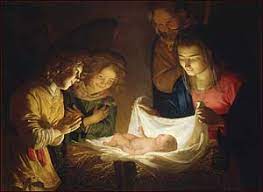Gospel for Christmas:
Jn 1:1-18
In the beginning was the Word,
and the Word was with God,
and the Word was God.
He was in the beginning with God.
All things came to be through him,
and without him nothing came to be.
What came to be through him was life,
and this life was the light of the human race;
the light shines in the darkness,
and the darkness has not overcome it.
A man named John was sent from God.
He came for testimony, to testify to the light,
so that all might believe through him.
He was not the light,
but came to testify to the light.
The true light, which enlightens everyone, was coming into the world.
He was in the world,
and the world came to be through him,
but the world did not know him.
He came to what was his own,
but his own people did not accept him.
But to those who did accept him
he gave power to become children of God,
to those who believe in his name,
who were born not by natural generation
nor by human choice nor by a man’s decision
but of God.
And the Word became flesh
and made his dwelling among us,
and we saw his glory,
the glory as of the Father’s only Son,
full of grace and truth.
John testified to him and cried out, saying,
“This was he of whom I said,
‘The one who is coming after me ranks ahead of me
because he existed before me.’”
From his fullness we have all received,
grace in place of grace,
because while the law was given through Moses,
grace and truth came through Jesus Christ.
No one has ever seen God.
The only Son, God, who is at the Father’s side,
has revealed him.
Bishop Barron:
Friends, our Gospel for Christmas day is the prologue to the Gospel of John. In many ways, it is the entire Gospel, indeed the entire Bible, in miniature.
Let’s turn to the central passage: “And the Word became flesh and made his dwelling among us.” The word used in Greek here for “dwelt” is eskenosen, which means literally, “pitched his tent among us.” Don’t read that in a folksy way. It is meant to call to mind the tabernacle of the temple.
The Word becoming flesh is God coming to dwell definitively in his world, undoing the effects of sin and turning it into what it was always meant to be. Notice, too, what we see in the wake of this tabernacling: “And we saw his glory, the glory as of the Father’s only Son, full of grace and truth.”
So John is telling us that Jesus is the new Eden, the new temple, the restored creation, the realization of God’s intention for the world. And our purpose is not simply to gaze on this fact with wonder but rather to enter into its power: “From his fullness we have all received, grace in place of grace.”


Recent Comments